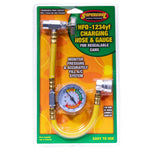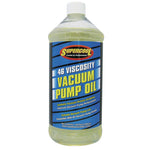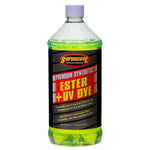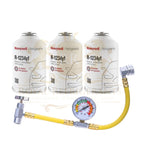You have no items in your shopping cart.
R404A: A Comprehensive Guide for Businesses Using Refrigerants
Introduction to R404A Refrigerant
R404A is a widely used hydrofluorocarbon (HFC) refrigerant commonly found in commercial refrigeration systems. It is primarily used in medium and low-temperature refrigeration applications, including supermarket freezers, cold storage units, and transportation refrigeration. As a business owner in the refrigeration or HVAC industry, it’s essential to understand the properties, benefits, and potential environmental impacts of R404A, especially as the world moves towards greener, more sustainable solutions.
In this blog, we’ll explore everything you need to know about R404A, including its uses, benefits, and the future of refrigeration systems.
What is R404A?
R404A is a blend of three HFC refrigerants: R125, R143a, and R134a. Its chemical composition gives it excellent thermodynamic properties, making it effective for use in a variety of refrigeration systems. Its primary advantage is its ability to function efficiently in low-temperature environments, making it ideal for applications that require consistent cooling, such as in food preservation or pharmaceutical storage.
Why is R404A So Popular in Commercial Refrigeration?
Versatility:
R404A is suitable for a wide range of refrigeration systems, from freezers to air conditioning units.
Efficiency:
The refrigerant provides high energy efficiency, which is crucial for businesses looking to cut down on energy consumption and reduce operating costs.
Non-Flammability:
R404A is non-flammable, making it a safe option for commercial refrigeration systems when handled properly.
Low Maintenance:
Equipment using R404A refrigerant tends to require less maintenance, leading to cost savings over time.
Environmental Considerations of R404A
Though R404A is an effective refrigerant, it has a significant environmental impact. It has a high Global Warming Potential (GWP), which means it contributes to climate change when released into the atmosphere. Due to its GWP of 3,922, R404A is being phased out in many regions, particularly in the European Union, as part of efforts to reduce greenhouse gas emissions.
For businesses, this means that R404A might soon become less available, and more environmentally-friendly alternatives may be required to meet regulations. In fact, the refrigerant’s phase-out is already underway, and companies will need to adapt to newer technologies and systems that use more sustainable refrigerants.

Alternatives to R404A
As environmental regulations become stricter, it’s essential to start considering alternatives to R404A. Some of the most promising alternatives include:
-
R448A: This refrigerant offers similar performance to R404A but with a significantly lower GWP, making it a more eco-friendly option.
-
R449A: Another low-GWP alternative that provides a direct replacement for R404A without requiring significant changes to existing refrigeration systems.
-
R290 (Propane): A natural refrigerant that is gaining popularity due to its low environmental impact, though it requires equipment that can handle flammable substances.
How Businesses Can Prepare for the Future
Evaluate Your Current Systems:
Businesses should assess their refrigeration systems and determine if they are using R404A. If they are, it’s important to start looking at alternatives that are compliant with future regulations.
Plan for Retrofitting:
Retrofitting systems to use alternative refrigerants can save businesses time and money. It’s a cost-effective option compared to replacing entire refrigeration units.
Stay Informed:
Regulations around refrigerants are continually evolving. Business owners must stay informed about the latest developments to ensure compliance with environmental regulations and avoid potential penalties.
Invest in Sustainable Solutions:
Ultimately, businesses should begin shifting towards sustainable refrigeration solutions. While R404A may have been a staple in commercial refrigeration, moving towards alternatives that have a lower environmental impact will not only help businesses comply with regulations but also align them with the growing trend of sustainability in the global market.
Conclusion
R404A has been a trusted refrigerant for commercial applications, but with environmental concerns and stricter regulations, businesses need to be proactive in transitioning to more eco-friendly alternatives. Understanding the impact of R404A, exploring alternatives, and staying ahead of regulatory changes will ensure that your business is prepared for the future of refrigeration.
 English
English







